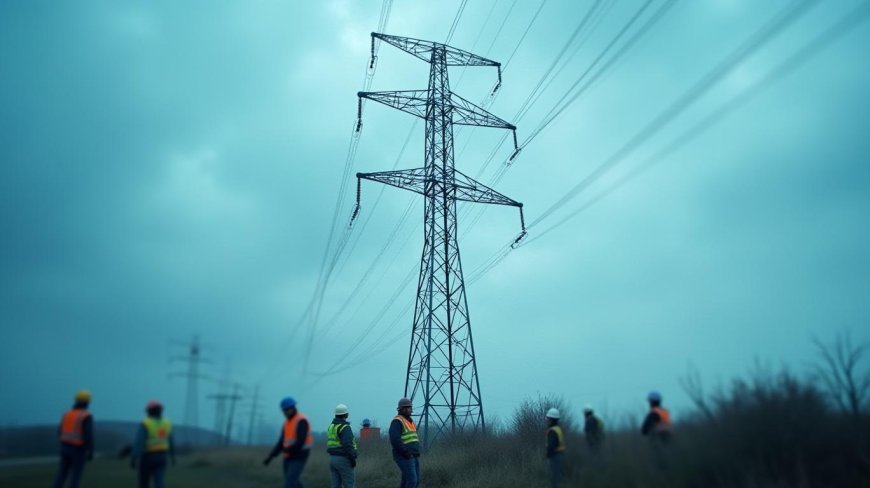Blackout Diplomacy: Europe’s Energy Crisis and the Geopolitical Storm behind It
One of the primary challenges facing both Spain and Portugal is their heavy reliance on renewable energy sources to power their national grids. While renewables such as wind and solar present cleaner alternatives to fossil fuels, they are not always consistent. In times of crisis, especially during weather fluctuations or sudden spikes in demand, the unstable nature of renewable output can evolve into a serious technical issue.

Blackout Diplomacy: Europe’s Energy Crisis and the Geopolitical Storm behind It
In recent months, Spain and Portugal have experienced a wave of widespread blackouts that have not only disrupted daily life but have also laid bare serious vulnerabilities in energy infrastructure, crisis management practices, and geopolitical dynamics within the European Union. These developments have sparked debates around overreliance on renewable energy, inadequacy of backup systems, and the looming threat of cyberattacks—or even deliberate sabotage.
One of the primary challenges facing both Spain and Portugal is their heavy reliance on renewable energy sources to power their national grids. While renewables such as wind and solar present cleaner alternatives to fossil fuels, they are not always consistent. In times of crisis, especially during weather fluctuations or sudden spikes in demand, the unstable nature of renewable output can evolve into a serious technical issue.
The intermittent nature of solar and wind energy creates a scenario where rapid drops in supply can leave power grids highly vulnerable to outages. Under such conditions, the need for fast and robust conventional backup systems becomes critical. Yet many regional power companies have underinvested in such infrastructure. Though environmentally progressive, this dependency on renewables must be balanced by stronger innovation in grid infrastructure and enhanced resilience to withstand emergency disruptions.
Beyond technical setbacks, there is also the issue of inadequate regional coordination within the EU during energy crises. The absence of a unified crisis management strategy among member states means that when major disruptions occur, rapid response mechanisms often fall short. Without an integrated framework for resource-sharing, information exchange, and technical collaboration, nations are left to face the fallout alone. This disjointed approach not only exacerbates systemic instability but also exposes major policy and infrastructure weaknesses across the bloc.
The social and economic fallout from these power outages is equally palpable. Urban centers across Spain and Portugal have witnessed severe disruptions in transportation systems, public services, and business operations—throwing daily life for millions into disarray. Businesses, particularly in metropolitan hubs, are grappling with halted production and fractured supply chains. Public institutions like hospitals and communication networks struggle to maintain operational efficiency, putting lives at risk and eroding public trust. The perceived inability of government institutions to respond effectively has contributed to a rising sense of public insecurity, as citizens grow increasingly concerned about future crises. The harsh realities of an energy emergency are not just reflected in economic metrics but felt deeply in people’s everyday lives.
In densely populated urban areas where economic activity is concentrated, experts have raised concerns about the lack of infrastructure to manage widespread blackouts. In these metropolitan zones, the stakes are higher: even brief interruptions in power can cascade into major disruptions to civil services and social order. These risks are further compounded by existing gaps in cybersecurity, which leave critical systems vulnerable to potential cyberattacks. As energy networks become increasingly digitalized, flaws in cybersecurity protocols open the door to large-scale interference.
The prospect of cyber breaches adds a new layer of anxiety to the energy crisis, forcing industry leaders and policymakers to urgently reconsider the robustness of their cyber defenses.
Timing has also fueled speculation about possible foreign interference—specifically involving Israel—particularly in light of the blackouts occurring shortly after Spain renewed its commitment to recognizing the State of Palestine, accompanied by outspoken criticism from Prime Minister Pedro Sánchez of Israeli military actions. While Spanish authorities have remained cautious in assigning blame, security experts suggest that the pattern and scope of disruptions bear the hallmarks of a sophisticated cyber operation.
The EU’s cybersecurity agency, ENISA, has also reported a surge in cyber threats targeting critical energy infrastructure, suggesting that state-backed actors may have been behind the attacks on European power grids. Prime Minister Sánchez’s recent statement confirmed an investigation into “all possibilities, including potential foreign involvement,” while emphasizing the need for a thorough inquiry before drawing final conclusions.
This unfolding crisis serves as a wake-up call for European energy security, highlighting the urgent need to strengthen infrastructure resilience and improve regional coordination. Several key priorities have emerged: reinforcing grid stability through greater energy storage capacity and better backup systems, developing more cohesive regional emergency protocols, and bolstering cybersecurity with advanced threat detection systems and international cooperation.
Moreover, the overlap between these outages and Spain’s diplomatic stance on Palestine adds a layer of geopolitical complexity to Europe’s energy security challenges—underscoring the growing intersection of energy, international politics, and cybersecurity in today’s Europe. As investigations continue, this incident reveals how vulnerable vital infrastructure has become, and how energy systems could be weaponized in broader geopolitical conflicts and power rivalries.
Author: Amin Mahdavi
Translator: Ashraf Hemmati













































